Credit Reporting Agency (CRA)
Credit Reporting Agencies are the organizations that take raw data that is a consumer’s financial history and convert it into what is known as a credit score. This credit score reflects the risk factor of extending a line of credit to a consumer. These agencies take a comprehensive credit history and current employment into consideration when reporting a credit score.
Different Credit Reporting Agencies
There are three Credit Reporting Agencies or CRA’s: Equifax, TransUnion and Experian. These Credit Reporting Agencies compile a credit report that they then sell to credit lending vorporations. These corporations in turn use this credit report in order to determine everything from credit spending limits to APR’s that determine the annual interest on a line of credit. A higher APR and lower credit limit almost always means that there may be an underlying issue with a credit report which is always worth taking a look at.
Requesting a credit report at the right time could uncover issues such as reporting errors and even identity fraud. Luckily, the Federal Trade Commission has made it mandatory that credit reporting agencies provide one free credit report per year. As a result of the compliance forced by the Federal Trade Commission, all data that is sent to either Equifax, Transunion and Experian will be handled with the utmost sensitivity.
Online Credit Reporting Agency
Be aware, the only website that is federally approved to issue a free annual credit report is www.annualcreditreport.com, any other website that advertises a “free credit report”, “free credit score” or anything along those lines can actually have “free trials” that expire and charge a fee; some may even be hosts to identity fraud. It may be unsafe to take chances with these websites as they may not take extra care to keep sensitive data secure.
Credit History and Credit Score
Once received, credit scores will tend to be from each credit reporting agency, these scores will typically be within range of each other. Most credit scores are out of 850 points with the minimum being 300. Experian, however, tends to use a scale from 330 to 830. A credit report from a CRA will always have a credit history and credit score, if there are any inconsistencies between the line holder’s credit history and any of the history on the credit report, it is generally a good idea to have it checked out. If you find that there are any errors either between you and the credit reports or between each of the credit reports, it is your responsibility to dispute this. These inconsistencies in a credit score can simply signal anything from a reporting error to a much more serious identity fraud.
Each credit reporting agency has its own methods of handling disputes, but will typically find in favor of disputer if facts do not line up. If errors are corrected, credit reporting agencies typically offer a free credit score report with a newly adjusted credit score. These new credit reports can drastically differ from a previous report found in error and may actually allow additional lines of credit that were not allowed previously.
Find More Information:
http://www.consumer.ftc.gov/articles/0155-free-credit-reports
https://www.ftc.gov/news-events/media-resources/consumer-finance/credit-reporting
https://www.annualcreditreport.com
https://www.creditkarma.com/article/differentscores

